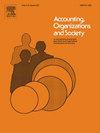当现行法律发生冲突:FASB/IASB概念框架的发展作为一个有争议的话语空间
IF 4
2区 管理学
Q1 BUSINESS, FINANCE
引用次数: 0
摘要
作为其专业化项目的一部分,独立的私人准则制定机构开发了概念框架来指导其准则制定。从法律多元主义的角度来看,我们认为这些软法律文件为标准制定者共同体创造了一种新的活法。在本文中,我们研究了FASB和IASB如何通过对概念框架(重新)发展的论述创造了这一新的活法。更具体地说,我们分析了从20世纪70年代到2010年代关于财务报告目标的论述。我们的材料源于董事会的正当程序,包括他们的建议,以及选民提交的约1300封意见信。我们发现FASB和IASB已经使用概念框架来确立他们作为独立专家的身份,将他们自己与传统的管理生活法的会计职业区分开来,取而代之的是引入新的决策有用性生活法。这一步骤遇到了阻力,因为成员不愿意接受标准制定者的独立性,并试图限制他们未来的活动。我们还发现,组成部分的观点受到概念框架对准则制定者和编制者的预期作用的影响。总体而言,我们的研究显示了标准制定者如何在战略上将概念框架与正当程序结合起来,而组成部分同时使用正当程序和概念框架作为约束标准制定者的工具。我们的发现扩展了我们对私人标准制定者、概念框架和不同法律形式的理解。本文章由计算机程序翻译,如有差异,请以英文原文为准。
When living laws collide: FASB/IASB conceptual framework development as a contested discursive space
As part of their professionalisation project, independent private standard setters have developed conceptual frameworks to guide their standard setting. Adopting the perspective of legal pluralism, we regard these soft law documents as creating a new living law for the community of standard setters. In this paper, we study how the FASB and the IASB have created this new living law through the discourse on the (re)development of conceptual frameworks. More specifically, we analyse the discourse on the objective of financial reporting from the 1970s to the 2010s. Our material stems from the Boards' due process and includes their proposals, along with about 1300 comment letters submitted by constituents. We find that the FASB and the IASB have used conceptual frameworks to establish their identity as independent experts, distinguishing themselves from the accounting profession with its traditional living law of stewardship, and instead introducing the new living law of decision usefulness. This step met resistance as constituents did not readily accept the standard setters' independence and sought to constrain their future activities. We also find that constituents’ views were influenced by the anticipated role of the conceptual frameworks for standard setters and preparers. Overall, our study shows how standard setters strategically align conceptual frameworks with the due process, while constituents simultaneously use the due process and conceptual frameworks as tools to discipline the standard setters. Our findings extend our understanding of private standard setters, conceptual frameworks, and different legal forms.
求助全文
通过发布文献求助,成功后即可免费获取论文全文。
去求助
来源期刊

Accounting Organizations and Society
BUSINESS, FINANCE-
CiteScore
7.80
自引率
6.40%
发文量
38
期刊介绍:
Accounting, Organizations & Society is a major international journal concerned with all aspects of the relationship between accounting and human behaviour, organizational structures and processes, and the changing social and political environment of the enterprise.
 求助内容:
求助内容: 应助结果提醒方式:
应助结果提醒方式:


